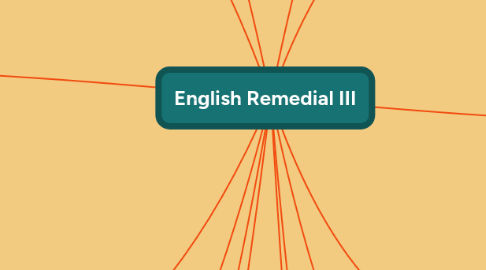
1. Another, other and others
1.1. ANOTHER AND OTHER
1.1.1. Stand before nouns
1.1.1.1. Have you got another none.
1.1.1.2. We make two other cameras.
1.1.1.3. Have you got any other models.
1.2. OTHERS
1.2.1. Is only used as a pronoun, referring to other things or other people.
1.2.1.1. Can you show me any others?
1.2.1.2. Have the others arrived?
1.2.1.3. I prefer the others.
2. Much, Many, A lot of
2.1. Much
2.1.1. With uncountable
2.2. Many
2.2.1. With plurals
2.3. A lot of
2.3.1. Both (with uncountable and with plurals)
3. Adverbs
3.1. Adverbs are used to modify verbs, adjectives or other adverbs
3.1.1. Example
3.1.1.1. I spoke English very well
3.1.2. Most adjectives
3.1.2.1. slow- slowlu
3.1.3. Note aslo:
3.1.3.1. good-well
3.1.3.2. fast-fast
3.1.3.3. hard-hard
4. SImple Present Passive
4.1. Passive voice is used when the focus in on the action. It is not important or not to known, however, who or what is perfoming the action
4.2. Grammar
4.2.1. Subject + finite of be + past participle
4.3. Exmple
4.3.1. A mistake was made.
5. Simple Past
5.1. We used to talk about a finished time
5.1.1. I changed my job last month.
5.1.2. I saw Tosca four years ago.
5.1.3. I visited Mr Schmidt when I was in Frankfurt.
5.2. Grammar
5.2.1. Affirmative
5.2.1.1. Person + verb in simple past + complement
5.2.2. Negative
5.2.2.1. Person + did not + verb in simple present + complete
5.2.3. Interrogative
5.2.3.1. Did + person + simple present + complement + ?
6. Present Perfect
6.1. We use Simple Present to talk about...
6.1.1. Experiences
6.1.1.1. Have you ever visited New York?
6.1.2. The unfinished past
6.1.2.1. I've worked for Datalab for/since
6.1.3. developments
6.1.3.1. Prices have risen since last year.
6.1.4. news
6.1.4.1. They have closed the design deparment.
6.1.5. Information
6.1.5.1. I have just seen Tony Kwon.
6.2. Grammar
6.2.1. Affirmative
6.2.1.1. Person + have + verb in past participle + complemente.
6.2.2. Negative
6.2.2.1. Person + have not + verb in past participle + complement.
6.2.3. Interrogative
6.2.3.1. Have + person + verb in past participle + complement + ?
7. Future ( will)
7.1. Wiil can be used for ...
7.1.1. Decisions
7.1.2. Promises
7.1.3. Predictions
7.1.4. Offers
7.2. Grammar
7.2.1. Affirmative
7.2.1.1. Person + will + verb in simple present + complement.
7.2.2. Negative
7.2.2.1. Person + will not + verb in simple present + complement.
7.2.3. Interrogative
7.2.3.1. Wiil + person + verb in simple present + complement + ?
8. Time Prepositions
8.1. Before
8.2. After
8.3. Until
8.4. In
8.5. At
8.6. On
8.7. From
8.8. During
8.9. For
8.10. Since
9. Adverbs of frequency
9.1. Always
9.2. Usually
9.3. Very often
9.4. Often
9.5. Sometimes
9.6. Occasionally
9.7. Never
10. so/souch
10.1. SO
10.1.1. We use so before adjectives without nouns.
10.1.1.1. It's so expensive
10.1.1.2. He's so generous.
10.2. SUCH
10.2.1. We use such before adjectives with nouns.
10.2.1.1. It´s such an expensive shop!
10.2.1.2. He's such a generous man.
11. Bussines vocabulary
11.1. balance sheet
11.2. expenditure
11.3. to pay off
11.4. over budget
11.5. bank loans
11.6. debts
11.7. creditors
11.8. healthy
12. A process description
12.1. Use the staments to write a paragraph.
12.1.1. First
12.1.2. Then
12.1.3. Next
12.1.4. After that
12.1.5. Finally
13. Comparative and superlative adjectives
13.1. Comparative
13.1.1. cleaner (one-syllable adjectives)
13.1.2. easier (two-syllabe adjectives ending in -y or er)
13.1.3. more difficult
13.2. Superlative
13.2.1. cleanest
13.2.2. easiest
13.2.3. most difficult
14. Let
14.1. Examples
14.1.1. Let me have a copy.
14.1.2. Could you let me have a copy.

